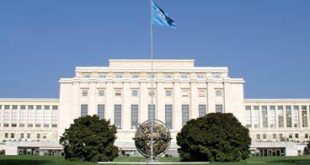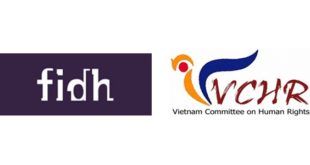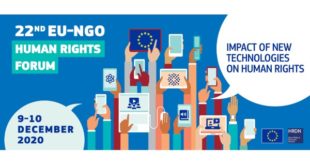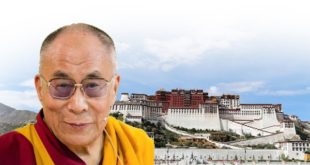Congressional Caucus on Vietnam & Congressional Caucus on Human Rights
Joint Members briefing on
VIETNAM : ONGOING RELIGIOUS FREEDOM VIOLATIONS
Wednesday, October 26, 2005
2200 Rayburn House Office Building, Washington D.C.
Testimony by VO VAN AI
Overseas Spokesman of the Unified Buddhist Church of Vietnam
Director of the International Buddhist Information Bureau
President, Quê Me : Action for Democracy in Vietnam & Vietnam Committee on Human Rights
Honorable Chairman,
Distinguished Members of Congress, Dear Friends,
I would like to thank you for giving me this opportunity to testify on behalf of the Unified Buddhist Church of Vietnam at this important Briefing today.
Today’s subject – religious freedom – is vitally important, for I believe that religious freedom is the key to development and democracy in Vietnam. This hearing is also very timely – Vietnam is under great pressure to improve its religious record, and its designation as a Country of Particular Concern is currently under review. If pressure is maintained, I believe we may be at a turning point in the movement for religious freedom and democracy in Vietnam.
The Vietnamese Communist Party is fully aware of the important role of religious communities, and this is why they are deploying every effort to stifle their voice. In Vietnam, the religious movements not only have a strong spiritual and moral influence, but they are also the social conscience of the people. Since 1945 in North Vietnam, and since 1975 in the South, the Hanoi government has succeeded in suppressing all political parties, free trade union movements and opposition movements. But it has failed to suppress the great religions, and today, independent religious movements are the sole surviving elements of Vietnamese civil society. With their strong popular following, influence and authority, religious movements, particularly Buddhism, Vietnam’s majority religion, have assumed a key role in voicing the people’s grievances and challenging the government not only on issues of religious freedom, but also on human rights and democratic freedoms for all the people of Vietnam.
The Unified Buddhist Church of Vietnam (UBCV), which is adhered to by over three quarters of the population, is Vietnam’s largest civil society movement, and for the past thirty years, it has been the most vocal defender of the people’s freedoms and rights. On 11th November 1975, just a few months after the Communists took power in April 1975, the UBCV launched the very first public protest against religious repression, with the immolation of 12 monks and nuns at the Duoc Su pagoda in the province of Can Tho. Again in 1993, the UBCV initiated the largest public demonstration in Vietnam, with the demonstration of 40,000 Buddhists for religious freedom in the central city of Hue.
The UBCV has paid a heavy price for its non-violent resistance. Banned by the State, its leaders arrested, its property confiscated, the UBCV remains a major target of repression in Vietnam. For the past 30 years, monks, nuns and followers have been arrested, detained, tortured and even murdered. Hundreds of UBCV Pagodas remain under Police surveillance. Today, hundreds of UBCV Pagodas remain under surveillance, Buddhist leaders and followers under house arrest, communications monitored or cut.. I cannot recount the horrors of these decades of persecution in this Briefing today. I will simply describe recent ongoing violations against the outlawed UBCV.
Religious freedom is formally guaranteed in Vietnam’s Constitution, but in practice, the Communist State remains hostile to this fundamental right. Since the Vietnamese Communist Party (VCP) pragmatically recognized the “utility value” of religions in the 1990s, Vietnam has tolerated a minimum freedom of worship under strict VCP control. But true freedom of religion remains taboo. Indeed, as the Political Report of the VPC’s Seventh Plenum in January 2003 clearly stated, the communist party’s objective is not to improve religious freedom but to “increase state management of religious affairs”.
In September 2004, for the very first time, the United States designated Vietnam as a “Country of Particular Concern” (CPC) and placed it on a blacklist of the world’s worst violators of religious freedom and human rights. This designation was a terrible setback for Hanoi’s leaders, who depend on Vietnam’s “good” image to win membership in the global economic community. At the same time, it was an unprecedented sign of international recognition and support for the peaceful movement of independent religious movements for religious freedom in Vietnam.
Clearly, CPC designation has brought results. Over the past year, Vietnam has released some prisoners of conscience, promised reforms and made some changes in its religious policies. But these changes are not improvements. On the contrary, they have grave implications, for they threaten the very survival of non-recognized religious movements in Vietnam. To avoid international condemnation, Hanoi has now devised a two-faced policy – one for “export only”, which claims respect for religious freedom and the rule of law, and another for “domestic consumption”, which implements subtle, sophisticated strategies to stifle, divide and paralyze religious communities. Repression remains devastating and pervasive, but it has now gone “underground”, and is carefully concealed from the public eye. I would like to quote some examples of the daily harassments encountered routinely by members if the outlawed Unified Buddhist Church of Vietnam today.
l Throughout July-September 2005, Vietnamese Security Police intensified repression against the UBCV. Repression is targeted against the leadership of new Provincial Committees founded by the UBCV to provide humanitarian and spiritual support to people in these poor provinces. Between July and September 2005, Committees were set up in Quang Nam-Danang, Thua Thien Hue, Binh Dinh, Khanh Hoa, Ba Ria-Vung Tau and Dong Nai provinces, and many others are currently being formed. The official creation of these Provincial Committees, despite the government’s ban on the UBCV, is a significant development, for they affirm the UBCV’s de facto existence, and put Vietnam’s promises of religious reform to test. Predictably, the authorities reacted by cracking down harshly on the leadership of these Provincial Committees, subjecting them to interrogation, threats and harassment. 18 members of the UBCV Provincial Committee in Binh Dinh, where the UBCV Patriarch is currently detained, were detained for non-stop interrogations from 15-18th August 2005. The Binh Dinh Committee’s Chairman, Venerable Thich Tam Lien, was subjected to such intense interrogations that he fell unconscious and had to be urgently hospitalised. In Khanh Hoa, 9 members of the Executive Committee were detained. During interrogations in Binh Dinh, Police accused the UBCV of “engaging in political activities” and “advocating democracy and pluralism”. Monks and nuns were ordered to disband the committees and renounce all contacts with banned UBCV.
l Just last week, on October 18, 2005, Security Police and local education authorities in Bac Lieu province threatened Huynh Huu Nhieu, schoolteacher and brother of Thich Thien Minh, a UBCV monk released this year after 26 years in re-education camp. The authorities showed Mr. Nhieu a transcript of a Radio Free Asia interview with Thich Thien Minh, and warned that he would lose his job and suffer grave consequences unless he prevented his brother speaking out in the international media. The next day, the authorities called him again and continued this psychological pressure. These threats are part of a systematic Police campaign against Thich Thien Minh and his family. Since his release in a government amnesty on February 2nd 2005, he has received death threats and suffered systematic harassment and controls simply for denouncing the abysmal detention conditions of religious prisoners in Vietnam’s prisons and camps. Thich Thien Minh sent my committee a list of 61 religious prisoners in Z30 A Camp in Xuan Loc, Dong Nai Province, where he was detained. Many of these prisoners are in very poor health – some are over 80 years old – yet they are still forced to perform hard labour and are deprived of medical care ;
l In September 2005, UBCV monk Thich Vien Phuong was fined 15 million dongs (approx. US$ 1,000) simply for filming a video message by Venerable Thich Quang Do to the UN Commission on Human Rights in Geneva in April 2005 calling for international support for a peaceful process of democratisation in Vietnam. This exorbitant fine – over 43 times the basic wage of a Vietnamese worker – was handed down by the Phu Nhuan People’s Committee, who accused Thich Vien Phuong of producing video-tapes “which are slanderous… but not serious enough to be punished under criminal law…”. (Ref. 697/QD-XPHC, 15.9.2005). Security Police had arrested Thich Vien Phuong on March 30th as he left Thanh Minh Zen Monastery and confiscated his video camera. Thanks to courageous Buddhist activists, an audiotape was finally smuggled to my Committee, and made public at the UN Human Rights Commission in Geneva. I include the text in appendix to my testimony.
l Following the directives of a Top-secret Communist Party document, “On Religions and the Struggle against Activities Exploiting Religion”, of which my Committee has obtained a copy, Hanoi’s special agents have developed strategies to create divisions within the UBCV and undermine the movement from within. A group of Security agents masquerading as a “Group for Buddhism and the People” have published several slanderous articles to sow distrust amongst Buddhist leaders and smear their reputation. In September, they circulated a false interview entitled “Dialogue with Thich Quang Do”, in which the UBCV Deputy leader supposedly criticized other Buddhist dignitaries. The article was sent to massively to Buddhist Pagodas all over Vietnam by the post and the Internet. In Khanh Hoa, special agents from the Religious Security Police (Bureau PA38) distributed this article throughout the province, and used it during interrogations with Sister Thich Nu Thong Man, a member of the Khanh Hoa UBCV Provincial Committee. Police forced her to read the article, and to renounce all contacts with the UBCV.
l Security Police and local authorities have sought to isolate UBCV monks, nuns and followers by subjecting them to all manner of surveillance and controls. Land phones are cut, cell phones confiscated, E-mail accounts closed down or blocked. The circulation of UBCV publications is also strictly banned. In August 2005, Nguyen Dinh Khoi, a leader of the “Buddhist Youth Movement” an education movement affiliated to the UBCV, was intercepted by Security Police in Saigon and fined 10 million dongs (almost $US 700) simply for circulating copies of an internal news bulletin entitled “White Lotus”. Police confiscated the bulletin and gave him 10 days to pay this crushing fine, the equivalent of over 28 times the basic working wage in Vietnam ;
l After almost 30 years in detention, UBCV Patriarch Thich Huyen Quang and his Deputy Thich Quang Do are still prisoners in the Nguyen Thieu Monastery (Binh Dinh) and the Thanh Minh Zen Monastery (Saigon) without any justification or charge. In June-August 2005, several delegations of monks attempting to visit Patriarch Thich Huyen Quang were intercepted and rebuffed by Police. The Head of the Government Board of Religious Affairs, Mr. Ngo Yen Thi, told Radio Free Asia that no one could visit the Patriarch without permission from the authorities, thus effectively disproving the government’s claims that both monks are “completely free”. In May 2005, the UN Working Group on Arbitrary Detention declared Thich Huyen Quang and Thich Quang to be victims of arbitrary detention (Opinion 18/2005), and called for their immediate release.
l Vietnam claims credit for its release of religious prisoners, yet almost all prisoners released in its highly-publicized “amnesties” continue to be held under virtual house arrest. Moreover, most are released after almost fully completing their prison sentences. Roman Catholic Priest Nguyen Thien Phung (aka Nguyen Viet Huan), member of the Congregation of the Mother Co-redemptrix, arrested in 1987, and human rights defender Tran Van Luong, had both almost fully served their prison sentences when they were amnestied on September 2nd 2005. Tran Van Luong, arrested on 9.12.1985, had only three months to serve before completing his 20-year prison term.
l Vietnamese Premier Phan Van Khai told President Bush in June 2005 that there are “no prisoners of conscience in Vietnam”. Yet evidence shows that thousands of political and religious prisoners are still detained under inhumane conditions in Vietnam’s prisons and camps. In a letter smuggled to the Vietnam Committee on Human Rights with a list of 61 prisoners of conscience in just one reeducation camp (Z30A Camp, Xuan Loc) former political prisoner Thich Thien Minh declared : “There are so many elderly political prisoners here, 70-80 year-old men who came into the camp as strong, healthy youths with heads of shining black hair. Now their hair has turned white, their bodies are bent, yet they are still detained. Even if they are released one day, they will be just like walking skeletons, good for nothing, just an extra burden for their families”.
These few examples are but the tip of the iceberg, and they give but a brief glimpse of the ongoing repression suffered by Buddhists and other non-recognized religious communities in Vietnam. They are not isolated phenomena, nor the result of zeal by local officials. They stem from a deliberate policy of repression orchestrated at the highest echelons of the Vietnamese Communist Party and the state.
There can be no religious freedom until this policy has been repealed, and until the VCP ceases to impose a political and ideological monopoly on the people of Vietnam. Indeed, as Venerable Thich Quang Do said in his Message to the UN, the basic conditions for religious freedom are pluralism and democracy, for “the UBCV and other non-recognized religions will never be free from religious repression until a democratic process is under way”.
Recommendations
I believe that the United States can play a crucial role in encouraging the respect of religious and human rights in Vietnam. I urge the Congressional Vietnam Caucus and the Human Rights Caucus to seize every opportunity to appeal for concrete progress, and impress upon the Vietnamese government that religious freedom and human rights are the foundations of fruitful US-Vietnam bilateral relations. Regarding US policy towards Vietnam, I propose that :
– the United States maintains Vietnam on the list of “countries of particular concern” until tangible, measurable progress has been made. Specifically, Vietnam should re-establish the UBCV’s legal status, release UBCV Patriarch Thich Huyen Quang, his Deputy Thich Quang Do and all other detained UBCV leaders, and restore their full freedoms and rights ;
– monitoring mechanisms should be set up to assess implementation of the Agreement signed between Vietnam and the State Department in May 2005 to ensure that Vietnam fulfills its promises and resolves all serious concerns ; The agreement should be rescinded if these pledges are not effectively fulfilled ;
– Permanent Normal Trade Relations’ status should not be granted to Vietnam until major improvements have been made. NTR should continue to be renewed annually, so give Congress can seriously review Vietnam’s human rights record and keep Vietnam under pressure to respect human rights ;
– promoting religious freedom, human rights and democracy should be inscribed in legislation regarding the US-Vietnam trade relationship. In the absence of a “human rights clause” in the Bilateral Trade Agreement, legislation such as the Vietnam Human Rights Act should be passed to link trade relations to the respect of religious freedoms and human rights.
I further urge the Congressional Vietnam Caucus and the Human Rights Caucus to support initiatives for the implementation of the “Appeal for Democracy in Vietnam” launched by Thich Quang Do. This 8-point transition plan could be a rallying-point for Vietnamese from different political and religious affiliations to work together for democratic change.
Benchmarks for the Vietnamese Government
I also urge the United States to propose specific benchmarks for improvement in religious freedom, calling on Vietnam specifically to :
– release all those in prison or under house arrest for their nonviolent religious and political convictions, including UBCV Patriarch Thich Huyen Quang, the Very Venerable Thich Quang Do and other detained UBCV leaders, cyber-dissidents Pham Hong Son, Nguyen Khac Toan, Nguyen Vu Binh, and all Montagnard Christians detained for their peaceful activities ;
– re-establish the legitimate status of the banned Unified Buddhist Church of Vietnam and all other non-recognized religions so they can contribute to the social and spiritual welfare of the Vietnamese people ;
– abrogate Article 4 of the Vietnamese Constitution on the mastery of the Communist Party so that all religious and political families may equally participate in reconstructing a democratic and prosperous Vietnam ;
– authorize the publication of private newspapers and media as a podium for democratic debate, and authorize the creation of free trade unions and non-governmental organizations to foster the emergence of a vibrant and dynamic civil society in Vietnam ;
– rescind all legislation that restricts the exercise of religious freedom, including Decree 31/CP on “administrative detention” and other legislation incompatible with Article 18 of the UN International Covenant on Civil and Political Rights ;
– allow a visit by the UN Representative on Human Rights Defenders and the UN Rapporteur on Freedom of Expression, as well as follow-up visits by the UN Special Rapporteur on Religious Freedom and the UN Working Group on Arbitrary Detention to monitor the situation of human rights defenders and prisoners of conscience in Vietnam.
Washington D.C., 26th October 2005
 Quê Me Quê Me: Action for democracy in Vietnam & Vietnam Committee on Human Rights
Quê Me Quê Me: Action for democracy in Vietnam & Vietnam Committee on Human Rights




